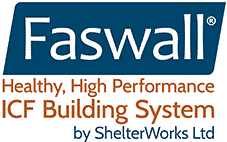Wet Climate Performance
Faswall holds up great in wet climates
Faswall green building blocks can also withstand very wet conditions. Tom Bristol of Purple Flattop Architecture in Chewelah, Washington, was skeptical about just how much the wood/concrete IFC wall forms could resist water, so he decided to run a test of his own.
Tom took a Faswall block and dropped it in a bucket of water. And left it there for 10 years.
The result? The Faswall green building block has seen little to no deterioration over that time.
Now, we’re certainly not recommending you build your home by a floodplain, a beach frequently ravaged by hurricanes or tsunamis, or an area prone to forest fires. But should disaster strike – which is more likely as climate change continues and the world’s weather gets more unpredictable – Faswall green building blocks will give you more reassurance that your home will last and stay safe.
Are you interested in building a home with ultra-durable, ultra-green Faswall? How about an office, commercial space, house of worship, wine cellar, root cellar, or another structure? Please contact us for more details.
Resists Mold - Breathability is Key
"Breathable" = Healthier and More Comfortable
Unlike foam ICF’s Faswall® is vapor permeable, which eliminates moisture and mold for your long-term health and decreased maintenance.
Relative Humidity is Kept Low
The vapor-permeable nature of the blocks is important when it comes to other factors that affect indoor air quality. Because of Faswall’s porous nature (i.e. the walls store and release water vapor through diffusion), the blocks keep relative humidity levels low enough that mold spores don’t grow in the walls. That keeps potentially toxic mold out of your building.
Faswall’s ability to regulate relative humidity also keeps the structure more comfortable and livable. Most of the time, humidity is higher inside a home due to activities such as showering, cooking, and even breathing. When a home has walls that don’t breathe, and therefore rely on mechanical ventilation to vacate moisture, the indoor air can become denser than the desired 30 to 40 percent humidity level. That leads to the heavy-feeling air we often experience in basements.
Faswall’s porosity allows excess indoor humidity to diffuse through the walls. With proper waterproofing, they don’t allow water to seep into structures. That’s why they’re great for foundations.
“The drainage and grading work around the foundation is also very significant, especially in a place that get lots of rain,” Coleman says. “Pitch the finished grade so that surface water flows away from the house. Do careful backfilling. Don’t slack off on it.”
-Coleman Pulsifer
Prepare Your Foundation for Drainage
Faswall is excellent for building ICF Foundations and Basements, and the Vapor Permeableness controls interior moisture, humidity and temperature.
Faswall’s experienced construction consultants can help you include these features so that you home stays safe and moisture-free.
“We did a lot of research on various green building systems but settled on Faswall. Not only did it seem like the “greenest” technology, but the ease of building compared to other systems seemed like a good choice for an owner/builder. What we didn’t expect, but were totally delighted with, was how knowledgable and helpful the people at Faswall were. We couldn’t have done it without you!”
-Ted and Donna Havecheck
You’d be surprised at the various types of homes and commercial buildings that can be built with Faswall. Check out some of the recent projects..
Photo Gallery
I Want To Get Started
Request Your Free Download "Get Started" Package:
includes: Design ideas, Product Data Sheet, Block Pricing, Technical and Installation Info, Engineering Details
Home Owner
Builder/Developer
Architect/Engineer
Educator/Student
Building Dept./Government
